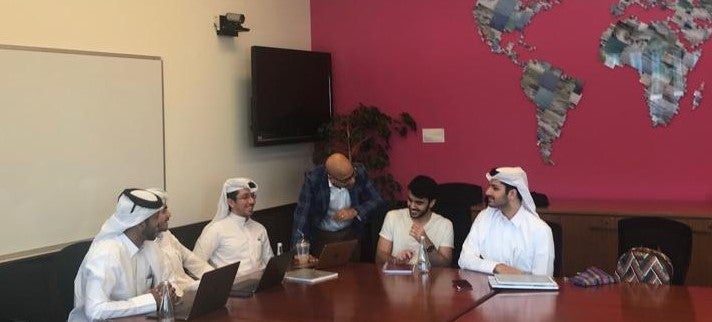Summer course in Arabic builds students’ critical thinking and understanding of the modern Arab World

Filled with enthusiasm for the subject, 14 GU-Q students attended a summer course called “The Intellectual Map of the Modern and Contemporary Arab World.” Taught in Arabic for six weeks during the summer session, the class gave advanced level students the opportunity to take part in heated debates showcasing their impressive Arabic and keen interest in political currents and trends in the Arab world.
Associate Professor Yehia A. Mohamed keeps the students engaged over the one and a half hour class by preparing a set of discussion points which he uses to help them overcome their initial shyness and positively participate. By asking them provocative questions, and encouraging them to respond to comments or expand on the points raised by their peers, the professor keeps a lively discussion going throughout the class.
For their part the students’ love for the subjects drives their participation, and they are eager to share their opinions and knowledge of subjects which they have studied during the year, or followed in the news. The course is in that way an important counterpoint to their regular studies, with the summer format with fewer classes giving them the ability to take their time and reflect on what they have learned so far. “The summer period is the best time to teach this advanced class because students have the time to prepare, read and think about the topics that are being discussed,” says Mohamed. “Some of the students are already doing similar readings out of their own interests, which significantly improves their performance in class.”
Beyond being a lesson in political and ideological terminology and political meanings in Arabic, the course offers a lesson in brainstorming, forming ideas, and refining personal stances. The students, who are mostly Qataris, have the chance to examine the details of issues either from a historical or comparative perspective.
For Mohamed, teaching the summer class is something he looks forward to every year because of the enthusiasm of the students. “I feel an immediate sense of positive return and satisfaction thanks to the students’ responses, their interaction, their involvement in the discussions and their enthusiasm to express their opinions and views after reading, researching and thinking about the issues under discussion.”
GU-Q offers a variety of summer programs for students at GU-Q and across Education City. The summer students are enrolled in one or more of the seven classes on offer, taught by GU-Q’s world-renowned faculty. Courses range from Arabic language through economics and politics to theology, and nearly a third of the attending students are enrolled in two courses. All summer courses earn students college credit.